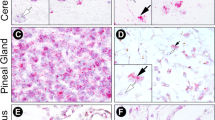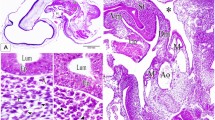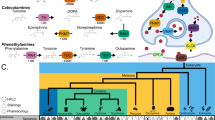Abstract
IT is well established that the central nervous system of vertebrates contains a substance which is biologically and chromatographically indistinguishable from 5-hydroxytryptamine. The tissues richest in 5-hydroxytryptamine are the diencephalon and mesencephalon, with little or none in the cerebellum or white matter. In the course of paper chromatographic studies on the distribution of 5-hydroxytryptamine in the brain of vertebrates, a second indole substance was noted and afterwards identified as the amino-acid, tryptophan. The distribution of tryptophan did not always follow closely that of 5-hydroxytryptamine, and this result may be of importance since it is believed that 5-hydroxytryptamine is formed by the decarboxylation of 5-hydroxytryptophan, an amino-acid formed from tryptophan.
This is a preview of subscription content, access via your institution
Access options
Subscribe to this journal
Receive 51 print issues and online access
$199.00 per year
only $3.90 per issue
Buy this article
- Purchase on Springer Link
- Instant access to full article PDF
Prices may be subject to local taxes which are calculated during checkout
Similar content being viewed by others
Author information
Authors and Affiliations
Rights and permissions
About this article
Cite this article
PRICE, S., WEST, G. Distribution of Tryptophan in the Brain. Nature 185, 470–471 (1960). https://doi.org/10.1038/185470a0
Issue Date:
DOI: https://doi.org/10.1038/185470a0
Comments
By submitting a comment you agree to abide by our Terms and Community Guidelines. If you find something abusive or that does not comply with our terms or guidelines please flag it as inappropriate.



